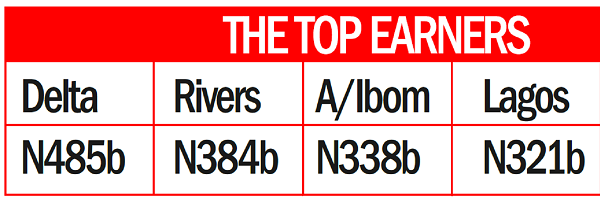
…Delta, Rivers, Akwa Ibom, Lagos, and Bayelsa lead with N1.8 trillion
…FAAC allocations grew by 95.49% in two years
The Federation Account Allocation Committee (FAAC) disbursed N5.38 trillion to Nigeria’s 36 states and the Federal Capital Territory (FCT) in 2024, an increase of N1.46 trillion from the N3.92 trillion allocated in 2023, according to data obtained by The Nation.
Monthly Allocations Breakdown
The disbursements varied throughout the year, influenced by revenue performance and allocation criteria:
January: N412.09 billion
February: N406.96 billion
March: N454.70 billion
April: N428.24 billion
May: N463.04 billion
June: N365.81 billion (lowest allocation)
July: N461.98 billion
August: N473.48 billion
September: N422.86 billion
October: N453.72 billion
November: N490.70 billion
December: N549.79 billion (highest allocation)
This significant increase was attributed to improved revenue generation from the removal of fuel subsidies, higher oil sales, and enhanced earnings from non-oil sectors such as taxes and royalties.
Leading Beneficiaries
Delta, Rivers, Akwa Ibom, Lagos, and Bayelsa states received the highest allocations, benefitting significantly from the 13% Derivation Fund tied to oil-producing states:
Delta: N485 billion
Rivers: N384 billion
Akwa Ibom: N338 billion
Lagos: N321 billion
Bayelsa: N293 billion
Other notable allocations:
Kano: N166 billion
Edo: N124 billion
Ondo: N122 billion
Anambra: N115 billion
Oyo: N113 billion
Comparative Analysis (2022–2024)
FAAC allocations have seen significant growth:
2022: States received N2.75 trillion.
2023: Allocations grew to N3.92 trillion.
2024: Allocations surged to N5.38 trillion, marking a 95.49% cumulative increase over two years.
Local governments (LGAs) also saw a significant rise:
2022: N1.995 trillion.
2023: N2.285 trillion.
2024: N3.994 trillion (a 74.76% increase from 2023).
The 13% Derivation Fund for oil-producing states reflected the following trends:
2022: N601.049 billion.
2023: N454.677 billion (a 24.34% decrease).
2024: N1.135 trillion (a 149.84% rebound).
Implications and Expert Opinions
The increased allocations underscore the Federal Government’s efforts to enhance revenue sharing across all tiers of government. Stakeholders have urged states to prioritize transparency and efficient resource management to ensure improved infrastructure, education, healthcare, and local governance.
Analysts predict continued revenue growth into 2025, driven by economic diversification and improved collection methods. They also emphasized the need for states to use these funds responsibly to foster long-term development and improve citizens’ quality of life.
The trends reflect Nigeria’s progress in federal revenue generation and equitable distribution, with a focus on sustaining growth and addressing local developmental needs.




![[PHOTOS] Offa Students Union N/HQ Secures 40 Slots In MOK Foundation’s 2026 JAMB Scholarship](https://newsbulletin.com.ng/wp-content/uploads/2026/02/1770395610721-300x300.jpg)


